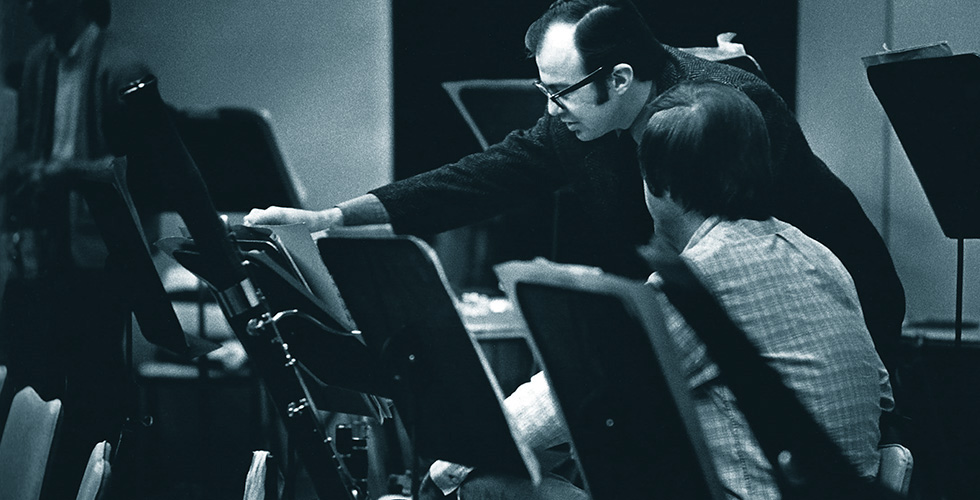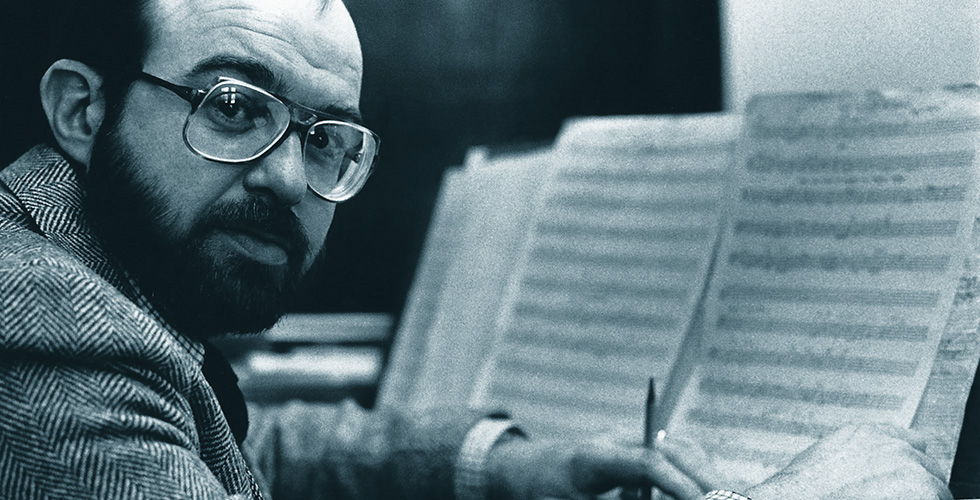
The American Academy of Arts and Letters has cited the work of Phillip Rhodes as music (which) radiates an evocative warmth of expression, while also exhibiting a highly disciplined approach to matters of form, continuity and textual setting. Born and raised in western North Carolina, his work is as strongly influenced by the traditional music of the Appalachian South as by the works of Bartok, Schoenberg, and Stravinsky which were the foundation of his early training. The aura of lilting fiddle tunes, mournful ballads, and compelling hymns permeates several of his most well-known works, including Reels and Reveries (Variations for Orchestra) and the Concerto for Bluegrass Band and Orchestra, Fiddletunes for Solo Violin and Synthesized Strings, Three Appalachian Settings for Chorus and Fiddle, and Two Appalachian Settings for String Quartet. In every case Rhodes speaks with a clear and convincing voice as noted in the following reviews:
From MusicWeb.com (United Kingdom) Neil Horner writes about Rhodes CD, With A Mountain View
This is a superb introduction to the music of American composer Phillip Rhodes the Love Song (Two Appalachian Settings] in particular is six minutes of sheer beauty All of this cycle [Mountain Songs] is seldom less than great but Jehovah is a towering achievement a spine-chilling Gaelic lament. It is the most outstanding piece on an outstanding disc and demands to be heard – to call it transcendent is not an exaggeration. Rhodes has another tour-de-force waiting at the end of the disc. Reels and Reveries is again, to these ears anyway, a masterpiece I cannot recommend this highly enough.
Sullivan at The American Record Guide puts Rhodes CD, With A Mountain View, into historical context
Over the past 30 years, North Carolina native Phillip Rhodes has written a series of pieces fusing concert music with folk tunes from the Appalachian South. This album brings together a number of them, ranging from austere vocal settings of The Unquiet Grave, Birdie Went A-Courtin and others, sung with austere power by Phyllis Bryn-Julson accompanied by Anne Mayer, to a rollicking Bluegrass-oriented variation set called Reels and Reveries, vividly played by the Owensboro Symphony under Michael Luxner. The notes don’t say this, but other composers are attempting similar fusions, among them John Beal, Wynton Marsalis, and Peter Schickele. But unless we count Ives and Copland, Rhodes was one of the first, and his works have an unusually wide range of moods and degrees of complexity. Reels is uninhibited fun, for example, whereas Fiddle Tunes has Bartokian experiments in dissonance and rhythmic displacement. The most appealing track is the first, a lovely and haunting quartet setting of Black is the Color of My True Loves Hair, which Rhodes wrote for his sons wedding. It is soulfully played by the Veblen Quartet. This album is ideal for those who love Bluegrass and old-time music as well as classical. There are more of us than you might think.
Reviews

Performance History
The American Orff-Schulwerk Association
The Anchorage (Alaska) Symphony
The Asheville Symphony
The Atlanta Symphony
The Austin (Texas) Symphony
The Baltimore Symphony
Boston Chamber Ensemble
The Buffalo Philharmonic
The Calgary Philharmonic (Canada)
The Cincinnati Symphony
The Cleveland Orchestra
The Contemporary Chamber Players
of the University of Chicago
The Chicago Ensemble
The Da Capo Chamber Players
The Dayton Philharmonic
The Delaware Symphony
The Dessoff Choirs (New York)
The Detroit Symphony
The Edmonton Symphony (Canada)
The Gregg Smith Singers
The Hartford Symphony
The Houston Pops Orchestra
I Cantori di New York
The Indianapolis Symphony
The Interlocken Center Symphony
The Louisville Orchestra
The Milwaukee Symphony
The National Symphony
The New Orleans Symphony
The Oakland Symphony
The Omaha Symphony
The Opera Theater of Florida State University
The Oregon Repertory Singers
Parnassus
The Paul Hill Chorale
The Phoenix Symphony
The Rhode Island Philharmonic
The Rochester (N. Y.) Philharmonic
The Sacramento Symphony
The Spokane Symphony
The St. Louis Symphony
The St. Paul Chamber Orchestra
The San Francisco Chamber Players
Speculum Musicae of New York
The Tucson Symphony

Biography
Phillip Rhodes was born in Forest City, North Carolina in 1940 and received degrees from Duke University and the Yale University School of Music. His principal teachers have been William Klenz, Iain Hamilton, Donald Martino, and Mel Powell.
Rhodes has been the recipient of numerous commissions and composition awards, including grants from the National Endowment for the Arts, the National Endowment for the Humanities, the Rockefeller Fund for Music, a citation and award from the American Academy of Arts and Letters, a Guggenheim Fellowship, two Tanglewood Orchestra Prizes, two McKnight Foundation Fellowships, two Fromm Foundation Commissions (Harvard), and a Bush Foundation Fellowship for Artists. Rhodes’ compositions are published by C. F. Peters, E.M.I., Theodore Presser, Ballerbach, Earthsongs, and Schott.
His music is recorded on labels including CRI, Centaur Records, First Edition (Louisville), Innova, and New World Records. Major performances of his works include those by the Atlanta Symphony at Carnegie Hall, the Cleveland Orchestra at the Blossom Festival, and the National Symphony at the Kennedy Center for the Performing Arts.
He is Andrew W. Mellon Professor of the Humanities Emeritus at Carleton College and served as the Composer-in-Residence there from 1974 to 2007. Prior to coming to Carleton, he served as Composer-in-Residence for the City of Louisville and for the State of Kentucky under the auspices of the Ford Foundation and the Kentucky State Arts Commission respectively.
For more detail see the biographical citation in The New Grove Dictionary as follows:
Phillip Carl Rhodes. The New Grove Dictionary of Music and Musicians. Second Edition (2001); volume 21, p.276.
